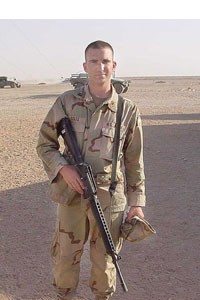John Soltz, the cofounder of VoteVets.org, is against the way the war in Iraq is being handled. Just don't call him "anti-war."
"VoteVets is a pro-military organization, and if I see 'anti-war' even in a headline, I go ballistic," exclaims Soltz, a 29-year-old Squirrel Hill native and Iraq war veteran. "What I have a problem with is that there is no real strategy for Iraq. I have a problem because our troops don't have the proper body armor and equipment that they need. I have a problem with our president, because he was handed a mandate following the mid-term elections to come up with a new strategy for the war on terror. His new strategy was to stay the course more and send 20,000 more troops to Iraq."
As opposition to the war in Iraq grows, Soltz represents an increasingly important part of the chorus: veterans who contend the war is being fought ineptly. A graduate of Washington & Jefferson College and an Army reservist stationed in Oakdale, Soltz has been making a name for himself and his organization. VoteVets was founded in Feburary 2006, and it already boasts more than 20,000 members. The group has been vehemently lobbying against the Bush administration's "surge," a planned escalation of 21,500 troops. VoteVets has been working with House and Senate leaders to force a vote on resolutions opposing the escalation.
In Pittsburgh, such concerns have been hitting closer to home. Since the war began in 2003, there have been more than 3,100 American troops killed and more than 23,600 wounded. Locally, three soldiers have been killed in the past month alone: 19-year-old Pvt. Matthew Bowe, an Army medic from Moon; Sgt. Russell Kurtz, 22, of Bethel Park; and 34-year-old Capt. Todd Siebert, of the North Hills.
As the death toll mounts, Soltz's criticisms become more strident. Of President Bush, he says, "[W]e're heading right toward the iceberg as he rearranges the deck chairs on the Titanic."
Soltz wasn't always against the president's plan. When he was first deployed to Iraq in 2003, Soltz says he supported the operation.
"When I went there, I believed there were weapons of mass destruction there," he explains. "I totally believed in the Kool-Aid I was drinking. So, no, I wasn't a political person when I went to Iraq.
"I didn't get political until I served there, came home and realized that my president had squandered the support for our troops by running an ineffective war."
He served in Iraq from May to September 2003, deploying logistics convoys with the First Armored Division. In 2005, he was called back to active duty and spent a year training troops at Fort Dix, N.J., for combat in Afghanistan.
During his service, Soltz saw soldiers deployed to a war zone without proper equipment. It wasn't just out-dated body armor that bothered him. Soltz was one of the first activists to speak out against poor conditions at Walter Reed Army Medical Center, where The Washington Post recently documented abysmal conditions for many wounded vets.
"Our leaders haven't been focused on the needs of our soldiers, that's what I saw in Iraq and that's what I saw when I got home," Soltz says. "We're trying to fill that void in the political discussion by leading the debate on these issues.
"Why isn't there a proper plan for this war? Why don't our troops have body armor, and why, after serving their country and being wounded, should they have to come home and live in mice-infested hospitals? I'm trying to make a difference for the men and women fighting and sacrificing for this country."
Soltz had worked for John Kerry's presidential campaign in 2004, but after returning from Fort Dix, he decided to take more direct action. "When I came home, I didn't feel served by my elected officials," Soltz says.
Soltz is a registered Democrat, though he calls himself a very conservative person. And there's nothing conservative, Soltz notes, about the president's war strategy.
"We have 90 percent of our security forces committed to nation-building in other countries," Soltz explains. "That's not a conservative war. On this issue, the president isn't conservative, he's out to lunch."
Soltz says his group is demanding that the president adopt the recommendations made by the bipartisan Iraq Study Group. The ISG advises launching a "diplomatic offensive" in the region by opening talks with neighboring Iran and Syria; it also notes that soldiers are under strain and that their equipment is wearing out quickly.
Like the ISG, Soltz worries that U.S. troops are spread too thin should another crisis develop. And the Iraq war, he says, has taken focus away from the terrorists who originally attacked the nation on 9/11.
"The Iraq war has delayed our ability to get the people who attacked this country and has become nothing more than a sideshow," Soltz says. "Osama bin Laden is hiding in a cave, getting fat eating lamb chops while we're playing reindeer games in Iraq."
While he's still an Army reservist, Soltz says his involvement in VoteVets.org and his military service are not at odds with one another. "There's nothing involved with moving convoys through Iraq that is at odds with what I'm doing at home. When I'm wearing the uniform, I don't talk politics."
Out of uniform, however, Soltz founded VoteVets.org in hopes of getting veterans elected across the country.
Soltz says that voters can't understand the conflict unless they hear from the troops who have served in it. The debate over the "surge," he says, shows just how unrealistic the rhetoric is. "When I served in Kosovo, our troop-to-citizen ratio was one to five," Soltz says. "There are 26 million people in Iraq. Do you think another 20,000 soldiers is going to make a difference? It's like spitting in the ocean."
Last year, VoteVets.org started running political advertisements against key Republicans: Pennsylvania's U.S. Sen. Rick Santorum and U.S. Rep. Melissa Hart; and Missouri Sen. Jim Talent.
The VoteVets.org advertisement targeting Hart, for example, featured Iraq veteran Thomas Young, sitting at a table.
"In Iraq, I watched everyone's back and trusted that the politicians who sent me would watch mine," he tells the camera. "Then, I get home, and I find out that [Hart] voted to cut health-care benefits for veterans like me. That may make sense from where she sits in Congress, but not where from where I'm sitting." As the camera pulls back, Young is seen sitting in a wheelchair.
In another commercial focusing on Sen. Santorum, the group used his vote against an earlier Iraq war funding bill.
"This is an AK-47, the rifle of choice for terrorists in Iraq and Afghanistan," says U.S. Army Reservist Pete Granato. "This is a vest left over from the Vietnam War. This is the protection we were given when we deployed to Iraq."
Granato then fires the rifle into the Vietnam-era flak jacket, and then into modern body armor. He walks over to the vests, demonstrating that while the bullets couldn't penetrate the body armor, the flak jacket let four bullets puncture the mannequin.
"The difference is life and death," Granato continues. Holding up the modern body armor, he says, "Senator Rick Santorum voted against giving our troops this. Now it's time for us to vote against him."
Some have questioned the fairness of the VoteVets campaign. The University of Pennsylvania's Annenberg Public Policy Center, for example, decried the Santorum ad on its Web site, Factcheck.org. For one thing, the group contends, calling the flak jacket a "leftover from the Vietnam War" was a "falsehood. The ad actually shows an improved vest that wasn't available until the 1980s."
But whatever their accuracy, the ads were as effective as those put out by the swift-boat veterans opposed to John Kerry in 2004. All three incumbents targeted by VoteVets lost their seats, at only modest cost to the veterans' group. During the election, VoteVets.org spent $59,965 against Hart, according to documents filed with the Federal Elections Commission. The group spent $32,931 against Santorum and $52,218 against Talent. In Pennsylvania, they backed Bucks County Democrat Patrick Murphy, an Iraq war vet, who won his race.
"Patrick Murphy is the only guy in Congress who can stand up and talk about the war in Iraq because he's been there," Soltz says. "The American people want to hear from the veterans who were there. They're tired of listening to Dick Cheney tell them what's best for Iraq."
VoteVets.org raised $1.3 million in the last election cycle; it has raised $3.5 million since its inception. To Soltz, that shows the group's message is getting through. However, among the groups debating the Iraq war, VoteVets seemingly stands alone. Its anti-surge approach is unpopular with other veterans' groups, while its pro-military standpoint is regarded warily by peace activists.
"They are entitled to their opinions, but we certainly don't agree with their stance," says Ramona Joyce, media-relations manager for the American Legion's national office. "We do not separate the war from the warrior.
"They say they support the troops, but not the mission. That sure sounds like an anti-war stance to me."
Soltz's group hasn't curried favor with peace activists either.
"The movement against the war in Iraq is a big tent, and as resistance to the war has grown, new sectors of society have moved into the political fight," says Alex Bradley of the Pittsburgh Organizing Group. But while he sees VoteVets' advocacy as part of that trend, he worries the group doesn't see the bigger picture.
"They are against the war because they feel it hasn't been executed correctly, not because they believe it was wrong to invade a country that never attacked us in a war we knew tens of thousands would die in."
Bradley is similarly cautious about VoteVets' mission of getting veterans into Congress. Such a movement might help in the fight against escalating this war, he says, but it could hurt efforts to stop the next one.
"The policies they support -- to increase the size of the military and to put more pro-military individuals into office -- may result in a short-term political gain" for anti-war activists, Bradley says. "But it will be at the cost of a further militarization of our society and the war economy. We should be talking about vastly reducing the size of the military and redirecting the trillions of dollars being spent on killing towards more humanitarian purposes, not on policies likely to lead to more wars in the years to come."
Too, Bradley says that focusing simply on American soldiers is symptomatic of a "U.S.-centric outlook" that is part of "what gets us into these wars in the first place." VoteVets "say little to nothing about the impact on Iraqis, nothing about holding accountable those U.S. soldiers who have and continue to abuse Iraqis, nothing about steps that could be taken to decrease civilian casualties."
Still, the group wields influence in Washington. Soltz has met with powerful Democrats like Speaker of the House Nancy Pelosi and U.S. Rep. John Murtha, of Johnstown. He has also earned the venom of powerful Republicans like presidential hopeful John McCain. McCain, a veteran and Vietnam POW himself, told The Washington Post that VoteVets was "a handful of veterans not representative of the military."
Others, like John Kerry, believe VoteVets should be heard from. Vincent Morris, Kerry's press secretary, says the group helps bring veterans to the public-policy table.
"Senator Kerry and Jon Soltz spent a lot of time together during the last two years," Morris says. "VoteVets is an important voice, and they are bringing a lot of pressure on Congress and elsewhere to rethink this ill-advised escalation of the war."
But Soltz says his group's message is one that American citizens can fully get behind -- support the troops by making sure they're properly equipped with the right gear and the right strategy.
"This is not a security mission," he says of the war in Iraq. "It's a political one with no military solution. Our troops deserve for our president to offer them a real strategy."

Based on the uniform, it might seem hard to believe that Squirrel Hill native John Soltz heads an organization opposing the escalation of the war in Iraq. Soltz, an Iraq War veteran who served in 2003, says he and his organization VoteVets.org are standing up to protect and support the troops still there.


















